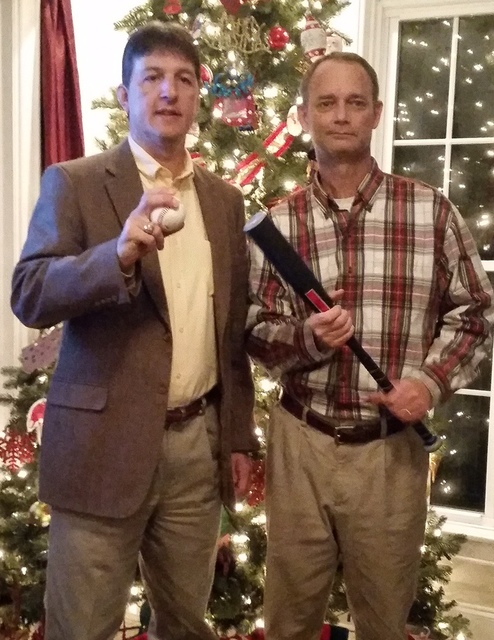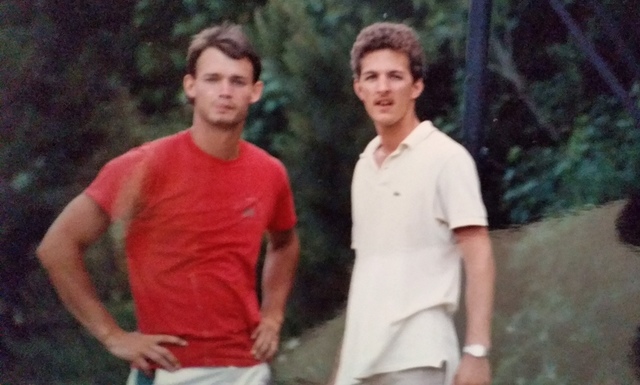

LAURINBURG — From their first meeting as roommates and teammates at Lenoir Community College in 1982, Ken Lewis and Roger Woolard had a lot in common.
“If you look at us, we’re about six foot one; we almost look identical as far as height and weight and so forth, we come from small communities, and we just happened to come together for the love of baseball,” said Lewis.
Within a year, an arm injury sent Lewis home to Tarboro while Woolard continued on to play for Lenoir and graduate from East Carolina University.
Their paths would converge 32 years later in a way neither, at that point, could have imagined.
Having lived with chronic kidney disease for more than 25 years, Woolard received his third kidney transplant in December 2014 at Vidant Medical Center, the primary teaching hospital for East Carolina’s Brody School of Medicine and one of five transplant centers in North Carolina.
In 1989, Woolard received his first transplanted kidney from his brother. Years later, in 2013, his body rejected a replacement donated by his wife. Last year, for the first time, Woolard received a new kidney from a complete stranger.
The first living donor kidney transplant, between identical twins, took place in Boston in 1954 and bought its recipient eight more years of life. The concept of a kidney exchange arose in the 1980s as a solution to the quandary of a willing living donor whose organ is incompatible with the intended recipient.
The first kidney exchange was performed in South Korea in 1991, and the procedure came to the United States in 2000, where it first took place at Rhode Island Hospital.
The premise is simple: someone close to a patient in need of a kidney transplant agrees to donate a kidney to another patient who is an excellent candidate to receive his or her kidney. In return, someone compatible with the original donor’s friend or family member donates their kidney on the recipient’s behalf.
At the end of his rope in June 2014, with his body rejecting his wife’s donated kidney, Woolard had exhausted the options within his immediate family.
Enter Ken Lewis.
The pair had remained close through the years. Two years earlier, Lewis had even moved from Tarboro to Laurinburg, where he manages the N.C. Farm Bureau agency, to be closer to Woolard, who lived in Moore County.
“He was there when my son was born, he’s helped us move, he’s just been a great friend; the best friend I’ve ever had in my life,” Lewis said.
Woolard’s voice over the phone was reticent. But the truth, that the quality of his life depended on finding a new kidney, could not be avoided.
Though the human body’s ability to function well with only one kidney — which will increase in size up to 25 percent in the absence of its twin — widens the donor pool to include the living, that brings a new list of qualifications to ensure the donor’s continued health.
“They have to be a healthy weight,” said Karen Chamberlin, Vidant Medical Center’s transplant coordinator. “Each center’s a little different on the weight requirement — we here go by BMI. They cannot be diabetic, they have to have good kidney function. High blood pressure is typically a rule-out.
“Recent cancer’s a rule-out … if it’s been a lot of years sometimes we’ll still consider them.”
With alacrity, Lewis and his wife Lisa volunteered to be tested. But doctors determined that Lisa was not qualified to donate, and that Lewis was not a match for Woolard.
Due to medical record privacy laws, Lewis had to break the news to his best friend himself. But he did not give up there. Hours of internet sleuthing later, Lewis discovered the phenomenon of the paired kidney exchange and, even more importantly, the lengths he was willing to go to help a friend.
As it happened, Lewis was a near-perfect match for another patient at ECU, 39-year-old Michael Tice.
“With the way things have gone as far as technology in the medical field, they have a database now and they can kind of put everyone in there,” Woolard said. “The matching system is a whole lot better than it was with my first one.”
Tice was planning to receive a kidney from Robin Melendez, a friend from his church band, who was compatible, but not as close a match as Lewis. Melendez was also compatible with Woolard.
Thus the cycle was complete.
The kidney swap would be only the third to be arranged at ECU, which has yet to join a national kidney database. But it was the best prospect for Woolard and Tice, better than joining a waiting list which, though composed primarily of patients living in the part of North Carolina east of Interstate 95, numbers more than 400.
“At first I didn’t want anybody to even know what I was doing,” Lewis said. “I’m a Christian and I believe in the Lord and I fall short of his glory every day, but I strive to be better today than I was yesterday. It felt like the Lord put in my spirit: how are you going to reach other people if you don’t tell them what you’re doing?
“I believe that when you have an opportunity to help people in life, and you can help them, you’re supposed to help them. To whom much is given, much is required to give back.”
Several months of preparation and testing ensued, including Lewis’ first colonoscopy — which, as he had just turned 50 and was due for one anyway, was the only element of the exchange he had to pay for.
“For Ken to do that, it wasn’t really a surprise,” Woolard said. “That’s just the guy he is: no matter what you need, he’s always there.”
Lewis had the support of his entire family: his wife, his two adult children, and his parents, who couldn’t disguise their anxiety.
“We just felt that those kids of his needed a daddy, so it was an easy decision for us,” Lewis said. “He needs to make a mark on those kids the way that we were able to make a mark on ours.”
All four participants were admitted at the same time for the kidney exchange, which took place two days before Christmas. Surgeons extracted healthy kidneys from Lewis and Melendez simultaneously, and when Lewis awoke from his two-hour procedure, Woolard and Tice were already in surgery.
Lewis recovered in record time.
“I walked all over that hospital the next day, because I wanted to go see the guy that got my kidney and I wanted to go see my friend Roger,” he said.
When greeting Tice the day after the kidney swap, any doubts Lewis may have had about his choice evaporated.
“I looked at him and when he saw me, it’s a thing you can’t really describe,” Lewis said. “He was still a very sick man, but he was sitting up in bed and he could talk. It’s almost like we automatically connected. He was truly grateful.”
While the recipients, who had suffered through ill health and regular dialysis treatments for months, took longer to recover, Lewis — down one kidney — was back at work exactly one week later.
This week, Woolard moved back to Moore County to resume his job as a technology teacher at Pinecrest High School.
“Right now I only go to the doctor once a month and then it will be every six months as long as everything stays good,” he said.
Though he anticipates at least 10 years of smooth sailing with his new kidney, his health has him embracing every new opportunity, which could, he is all too aware, be his last.
“For me it’s there all the time: you don’t know how long you’ve got until your time’s up,” he said. “But I don’t sit around and worry about it.”
As for Lewis, who to his chagrin has no kidneys left to donate, he now believes that living donation is an avenue that more healthy people should consider.
“People have been very, very kind to me in telling me what a noble thing that was,” he said. “Nobody gets tired of hearing those things, but that isn’t the reason I did it. I did it because it was the right thing to help my friend.”
Mary Katherine Murphy can be reached at 910-506-3169.
